Junghee Choi
@jchoi.bsky.social
Assistant professor @ou.edu studying higher education policy and finance
Reposted by Junghee Choi
I have a new AERA Open article on the prevalence and effects of differential tuition policies at public universities. About half of public universities have adopted differential tuition, but any benefits of increased completions disproportionately flow to White students. Check it out!

Sage Journals: Discover world-class research
Subscription and open access journals from Sage, the world's leading independent academic publisher.
journals.sagepub.com
May 21, 2025 at 5:46 PM
I have a new AERA Open article on the prevalence and effects of differential tuition policies at public universities. About half of public universities have adopted differential tuition, but any benefits of increased completions disproportionately flow to White students. Check it out!
Reposted by Junghee Choi
I have a new open-access article in the Journal of Postsecondary Student Success that examines whether colleges respond to accountability pressures by trying to increase enrollment. At least in the short term, that may have been the case.
journals.flvc.org/jpss/article...
journals.flvc.org/jpss/article...
View of Examining the Relationship Between Institutional Financial Stress and Student Enrollment
| Journal of Postsecondary Student Success
journals.flvc.org
April 30, 2025 at 4:02 PM
I have a new open-access article in the Journal of Postsecondary Student Success that examines whether colleges respond to accountability pressures by trying to increase enrollment. At least in the short term, that may have been the case.
journals.flvc.org/jpss/article...
journals.flvc.org/jpss/article...
Reposted by Junghee Choi
Just posted updated version of our DID textbook! We now have drafts of all chapters, including the one on general designs! Now you can tell your friends still on X that they are DID-outdated :-) Happy easter for those of you that celebrate it. papers.ssrn.com/sol3/papers....
Credible Answers to Hard Questions: Differences-in-Differences for Natural Experiments
This book introduces applied researchers to modern Differences-in-Differences (DID) methods, that they can use to obtain credible answers to hard causal inferen
papers.ssrn.com
April 18, 2025 at 2:28 PM
Just posted updated version of our DID textbook! We now have drafts of all chapters, including the one on general designs! Now you can tell your friends still on X that they are DID-outdated :-) Happy easter for those of you that celebrate it. papers.ssrn.com/sol3/papers....
Reposted by Junghee Choi
Heartbreaking to see announcements of major layoffs at most research organizations that have played a vital role in supporting federal statistics for education and developing high-quality evidence about what policies/practices actually work.
Below are just a few examples from my LinkedIn feed.
Below are just a few examples from my LinkedIn feed.
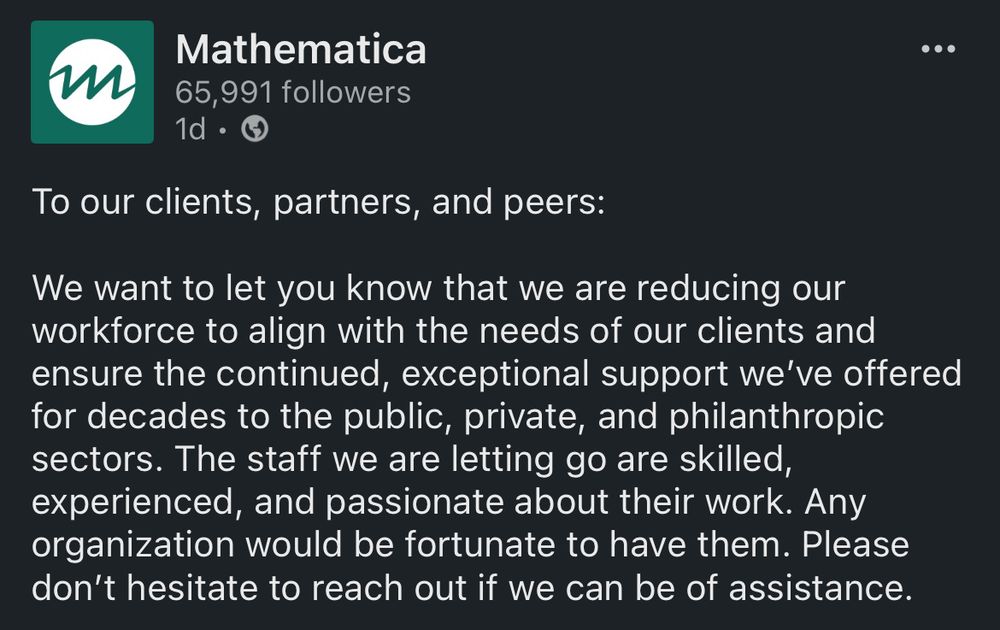
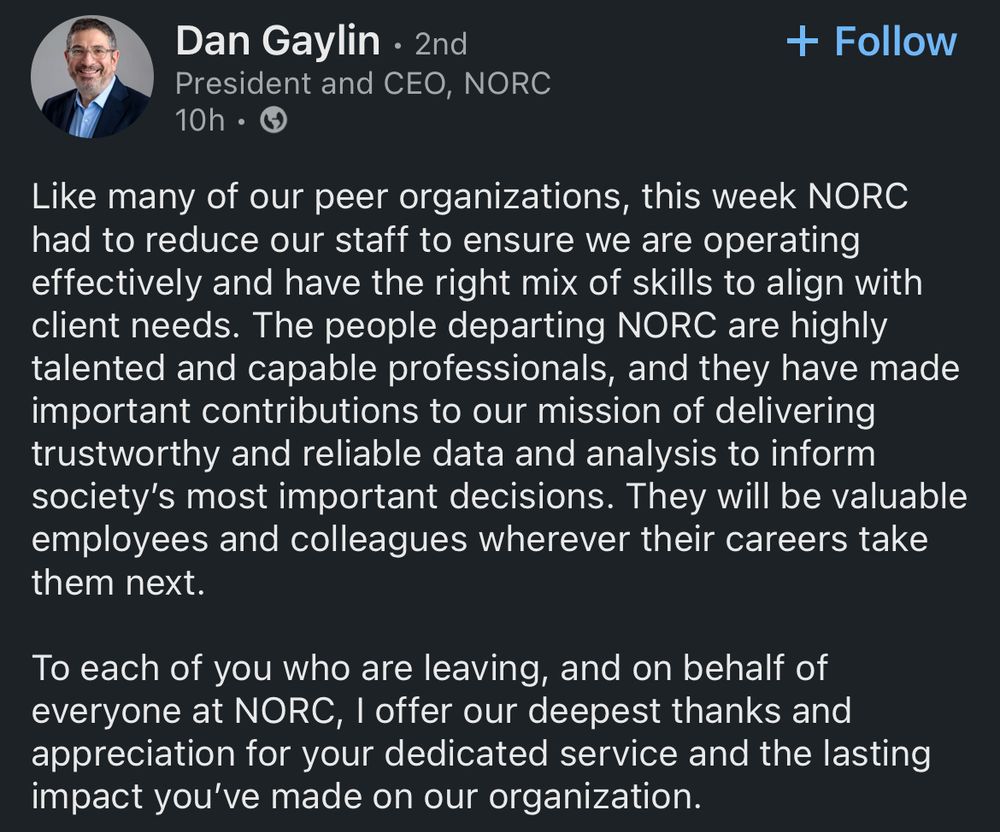
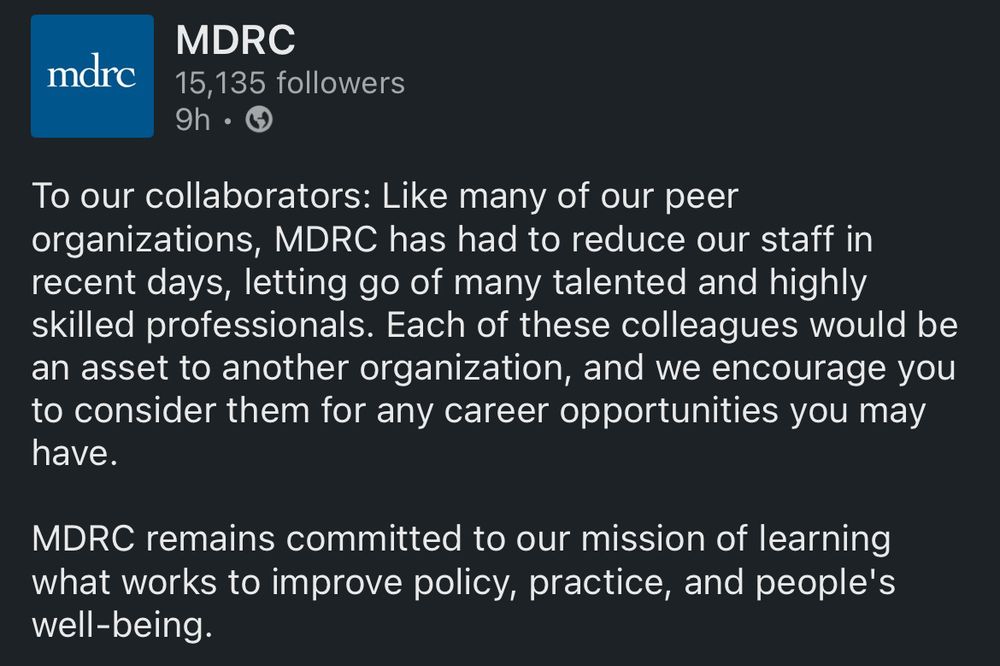
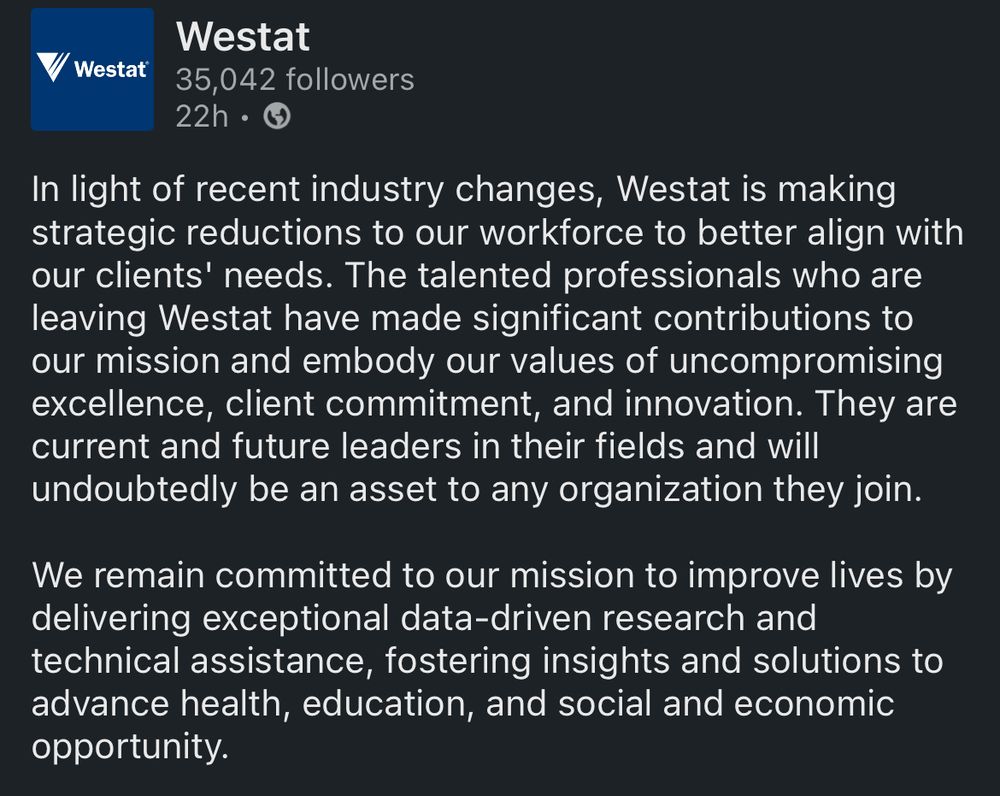
March 8, 2025 at 4:08 PM
Heartbreaking to see announcements of major layoffs at most research organizations that have played a vital role in supporting federal statistics for education and developing high-quality evidence about what policies/practices actually work.
Below are just a few examples from my LinkedIn feed.
Below are just a few examples from my LinkedIn feed.
Reposted by Junghee Choi
I like a good discussion of administrative spending in higher ed, but this piece misses the mark. The reason why big universities have more non-instructional than instructional staff is the research and healthcare enterprises. IPEDS staffing data are not a good measure for "administrative bloat."
www.aei.org
March 5, 2025 at 2:31 PM
I like a good discussion of administrative spending in higher ed, but this piece misses the mark. The reason why big universities have more non-instructional than instructional staff is the research and healthcare enterprises. IPEDS staffing data are not a good measure for "administrative bloat."
Reposted by Junghee Choi
We streamlined six new DID-like estimators and created this tutorial for implementation in R.
yiqingxu.org/packages/fec...
Hope you no longer need to spend months figuring out what these estimators are and how to use them.
yiqingxu.org/packages/fec...
Hope you no longer need to spend months figuring out what these estimators are and how to use them.
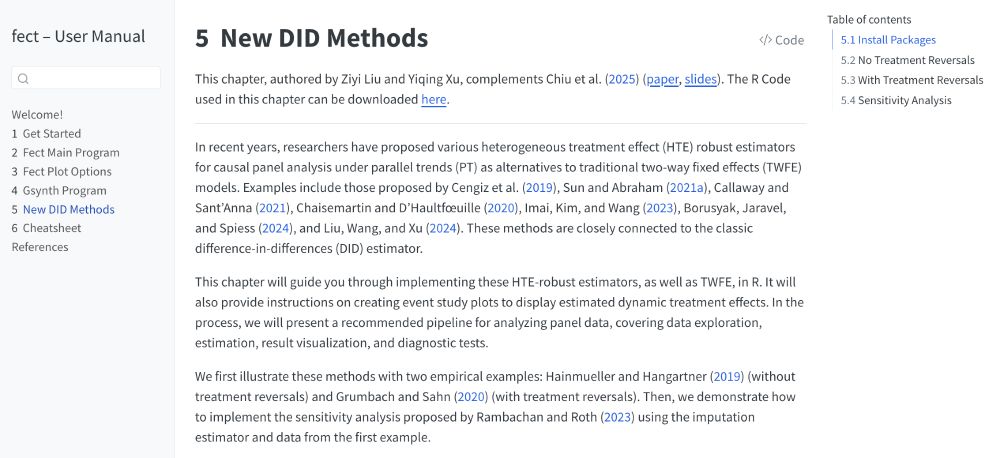
February 21, 2025 at 4:41 AM
We streamlined six new DID-like estimators and created this tutorial for implementation in R.
yiqingxu.org/packages/fec...
Hope you no longer need to spend months figuring out what these estimators are and how to use them.
yiqingxu.org/packages/fec...
Hope you no longer need to spend months figuring out what these estimators are and how to use them.
Reposted by Junghee Choi
1/ I am seeing a lot of comments on the slashing of NIH support along the lines of “universities should just spend their huge endowments.”
I’m the last person to cheer on the institutional stratification rising endowments have contributed to. But let me explain why this is not a solution.
I’m the last person to cheer on the institutional stratification rising endowments have contributed to. But let me explain why this is not a solution.
February 18, 2025 at 1:48 PM
1/ I am seeing a lot of comments on the slashing of NIH support along the lines of “universities should just spend their huge endowments.”
I’m the last person to cheer on the institutional stratification rising endowments have contributed to. But let me explain why this is not a solution.
I’m the last person to cheer on the institutional stratification rising endowments have contributed to. But let me explain why this is not a solution.
Reposted by Junghee Choi
Here are some more thoughts on this topic. robertkelchen.com/2025/02/12/b...
February 12, 2025 at 2:33 PM
Here are some more thoughts on this topic. robertkelchen.com/2025/02/12/b...
Reposted by Junghee Choi
Thanks to @lpeblog.bsky.social for the invitation to write about what policy scholars should do if "policy" is permanently broken. There are lots of good answers, but we can't afford to ignore the question.
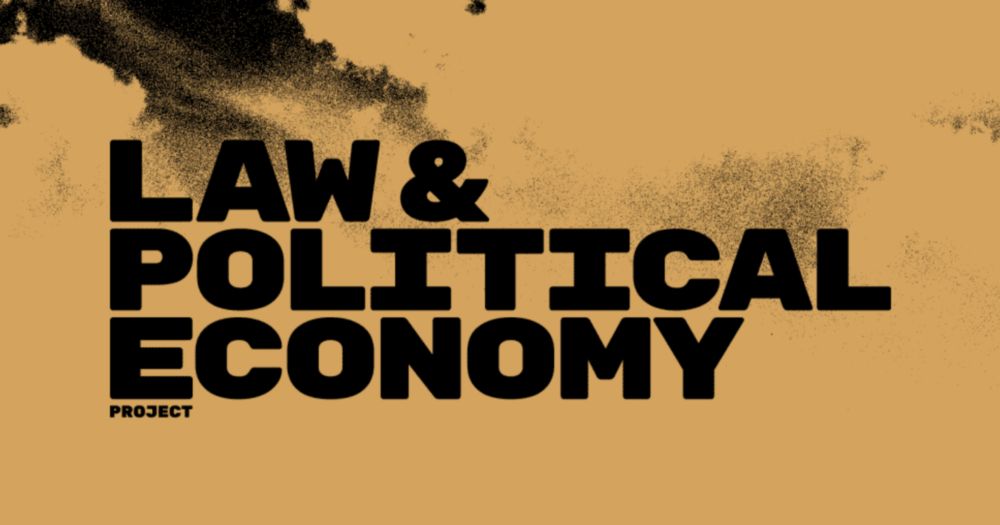
In This Brave New World, Does Scholarship Still Matter?
If the recent past is no longer a useful guide to seeking change in the present, what good is policy-adjacent scholarship?
lpeproject.org
January 28, 2025 at 6:46 PM
Thanks to @lpeblog.bsky.social for the invitation to write about what policy scholars should do if "policy" is permanently broken. There are lots of good answers, but we can't afford to ignore the question.
Reposted by Junghee Choi
There are a lot of new master's degree programs, and I have been concerned that they generate a return for the college but not for students. However, my newest working paper finds that new master's programs generate similar outcomes to longstanding programs (and even a bit better at privates).
edworkingpapers.com
January 27, 2025 at 7:31 PM
There are a lot of new master's degree programs, and I have been concerned that they generate a return for the college but not for students. However, my newest working paper finds that new master's programs generate similar outcomes to longstanding programs (and even a bit better at privates).
Reposted by Junghee Choi
In an ideal world we would have a government statistical agency doing this work of counting college students
However Congress has banned the existence of a federal “unit record” data system bc higher ed lobbyists pressed them to
Wouldn’t want transparency and accountability after all
However Congress has banned the existence of a federal “unit record” data system bc higher ed lobbyists pressed them to
Wouldn’t want transparency and accountability after all
January 14, 2025 at 12:17 PM
In an ideal world we would have a government statistical agency doing this work of counting college students
However Congress has banned the existence of a federal “unit record” data system bc higher ed lobbyists pressed them to
Wouldn’t want transparency and accountability after all
However Congress has banned the existence of a federal “unit record” data system bc higher ed lobbyists pressed them to
Wouldn’t want transparency and accountability after all
Reposted by Junghee Choi
California's governor is proposing sizable cuts to colleges while holding student financial aid funds flat. This is yet another example of states slowly shifting higher ed support from colleges to students, which seems to be a political winner.

Wins and losses for higher ed in California budget
California governor Gavin Newsom’s $322 billion budget plan, revealed in greater detail Friday, came with some notable wins and losses for higher ed. The proposed 2025–26 fiscal year budget slashed on...
www.insidehighered.com
January 13, 2025 at 10:28 AM
California's governor is proposing sizable cuts to colleges while holding student financial aid funds flat. This is yet another example of states slowly shifting higher ed support from colleges to students, which seems to be a political winner.
Reposted by Junghee Choi
Does starting a Division III college football program benefit the institution? www.sciencedirect.com/science/arti...
"the effect on enrollment is indistinguishable from zero...the proportion who are women falls...unable to provide evidence that the drawing of the endowments slowed"
"the effect on enrollment is indistinguishable from zero...the proportion who are women falls...unable to provide evidence that the drawing of the endowments slowed"

Does starting a Division III college football program benefit the institution?
I ask whether the addition of a college football team playing at the Division III level effects three dimensions to an institution’s success: enrollme…
www.sciencedirect.com
January 12, 2025 at 6:27 PM
Does starting a Division III college football program benefit the institution? www.sciencedirect.com/science/arti...
"the effect on enrollment is indistinguishable from zero...the proportion who are women falls...unable to provide evidence that the drawing of the endowments slowed"
"the effect on enrollment is indistinguishable from zero...the proportion who are women falls...unable to provide evidence that the drawing of the endowments slowed"
Reposted by Junghee Choi
1/12. Lots of engagement with this Walmart research post. I wanted to follow up on one of the themes I noticed in reactions. This will be a longer thread than I usually write, but I want to weave together a few related points on science (and communication about it), public engagement, and policy.
"Walmart makes the places it operates in poorer than they would be if it had never shown up at all. Sometimes consumer prices are an incomplete, even misleading, signal of economic well-being."
Fascinating studies on the broader effects of Walmart:
www.theatlantic.com/ideas/archiv...
Fascinating studies on the broader effects of Walmart:
www.theatlantic.com/ideas/archiv...

The Walmart Effect
New research suggests that the company makes the communities it operates in poorer—even taking into account its famous low prices.
www.theatlantic.com
January 12, 2025 at 9:29 PM
1/12. Lots of engagement with this Walmart research post. I wanted to follow up on one of the themes I noticed in reactions. This will be a longer thread than I usually write, but I want to weave together a few related points on science (and communication about it), public engagement, and policy.
Reposted by Junghee Choi
I have a new @nberpubs.bsky.social working paper out with @dubravkaritter.bsky.social and @dougwebberecon.bsky.social that examines the extent to which college closures can be predicted. Using machine learning, we improve on traditional models. But it's still hard to predict exact closure dates.

Predicting College Closures and Financial Distress
Founded in 1920, the NBER is a private, non-profit, non-partisan organization dedicated to conducting economic research and to disseminating research findings among academics, public policy makers, an...
www.nber.org
December 2, 2024 at 10:06 AM
I have a new @nberpubs.bsky.social working paper out with @dubravkaritter.bsky.social and @dougwebberecon.bsky.social that examines the extent to which college closures can be predicted. Using machine learning, we improve on traditional models. But it's still hard to predict exact closure dates.
Reposted by Junghee Choi
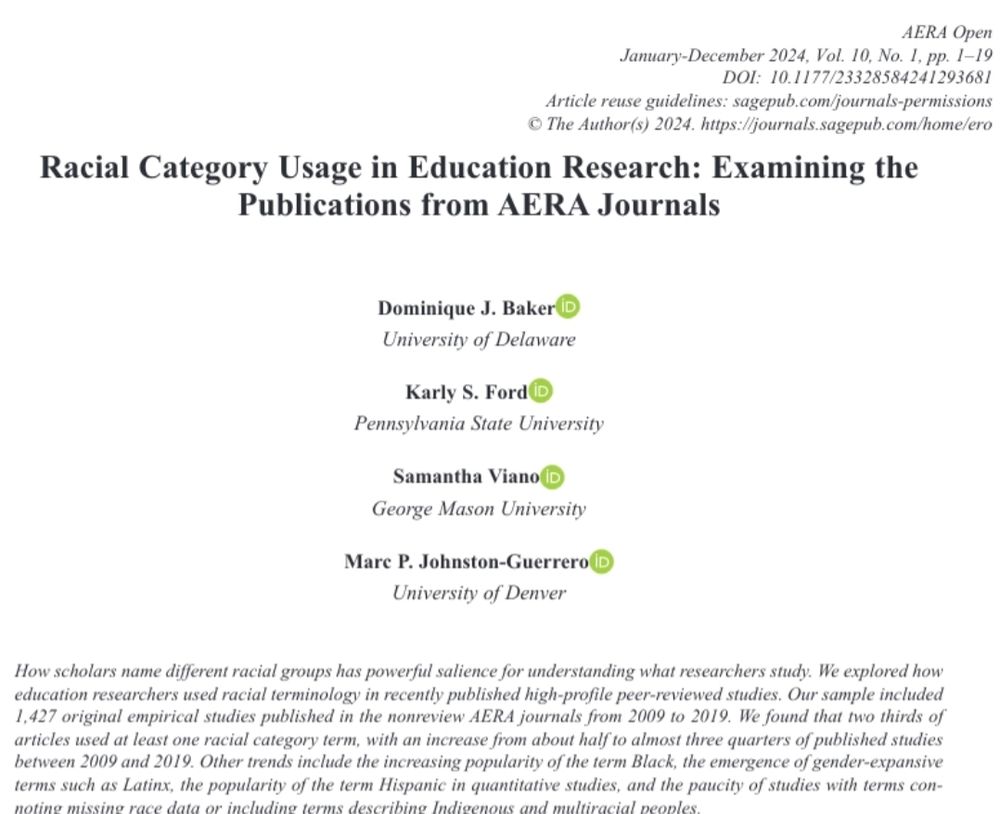
November 15, 2024 at 5:27 PM
Reposted by Junghee Choi
I wrote a @chronicle.com essay highlighting some warning signs that a college or academic program might be in financial trouble. It's crucial for students, faculty, and staff to keep their eyes open to see potential issues as soon as possible so they can make plans.

Is Your College About to Close?
Here are the telltale signs of financial distress.
www.chronicle.com
September 30, 2024 at 4:55 PM
I wrote a @chronicle.com essay highlighting some warning signs that a college or academic program might be in financial trouble. It's crucial for students, faculty, and staff to keep their eyes open to see potential issues as soon as possible so they can make plans.
Reposted by Junghee Choi
College rankings season concludes today with the release of the US News rankings. Start with their detailed methodology page before looking at where your favorite college ranks (this is what you should always do with rankings). www.usnews.com/education/be...
September 24, 2024 at 4:38 PM
College rankings season concludes today with the release of the US News rankings. Start with their detailed methodology page before looking at where your favorite college ranks (this is what you should always do with rankings). www.usnews.com/education/be...
Reposted by Junghee Choi
My latest: I wrote about some of the recent budget slashing at regional publics and how federal Covid aid may have helped make the situation worse.

This Is Why Some Regional Public Colleges Are In So Much Trouble
Deep cuts at public comprehensive colleges have often made news, but this year they seem deeper and more brutal than ever.
www.chronicle.com
September 18, 2024 at 3:46 PM
My latest: I wrote about some of the recent budget slashing at regional publics and how federal Covid aid may have helped make the situation worse.
Reposted by Junghee Choi
The key takeaway from my InformEd States team's latest brief: while how states fund public higher ed can marginally influence student outcomes, how much they fund matters a lot more.

Designing state funding formulas for public higher education to center equity | Brookings
The level of funding allocated to colleges and universities is substantially more important for student outcomes than how funding is allocated.
www.brookings.edu
August 10, 2024 at 10:11 AM
The key takeaway from my InformEd States team's latest brief: while how states fund public higher ed can marginally influence student outcomes, how much they fund matters a lot more.
Reposted by Junghee Choi
A reminder: I'm searching for two associate/full professors to join me in my thriving department.
Leadership studies (undergraduate-focused): apply.interfolio.com/130210
Higher education (focused on starting an EdD): apply.interfolio.com/130214
Application review begins 10/16!
Leadership studies (undergraduate-focused): apply.interfolio.com/130210
Higher education (focused on starting an EdD): apply.interfolio.com/130214
Application review begins 10/16!
September 25, 2023 at 4:41 PM
A reminder: I'm searching for two associate/full professors to join me in my thriving department.
Leadership studies (undergraduate-focused): apply.interfolio.com/130210
Higher education (focused on starting an EdD): apply.interfolio.com/130214
Application review begins 10/16!
Leadership studies (undergraduate-focused): apply.interfolio.com/130210
Higher education (focused on starting an EdD): apply.interfolio.com/130214
Application review begins 10/16!



